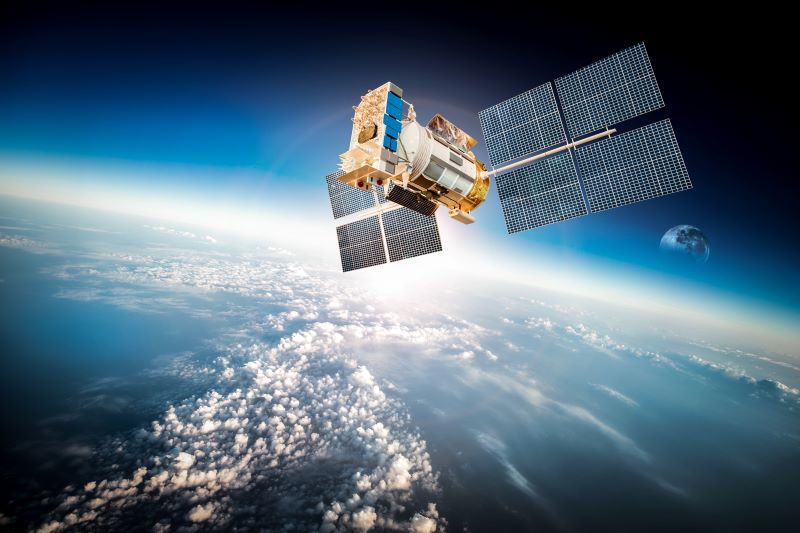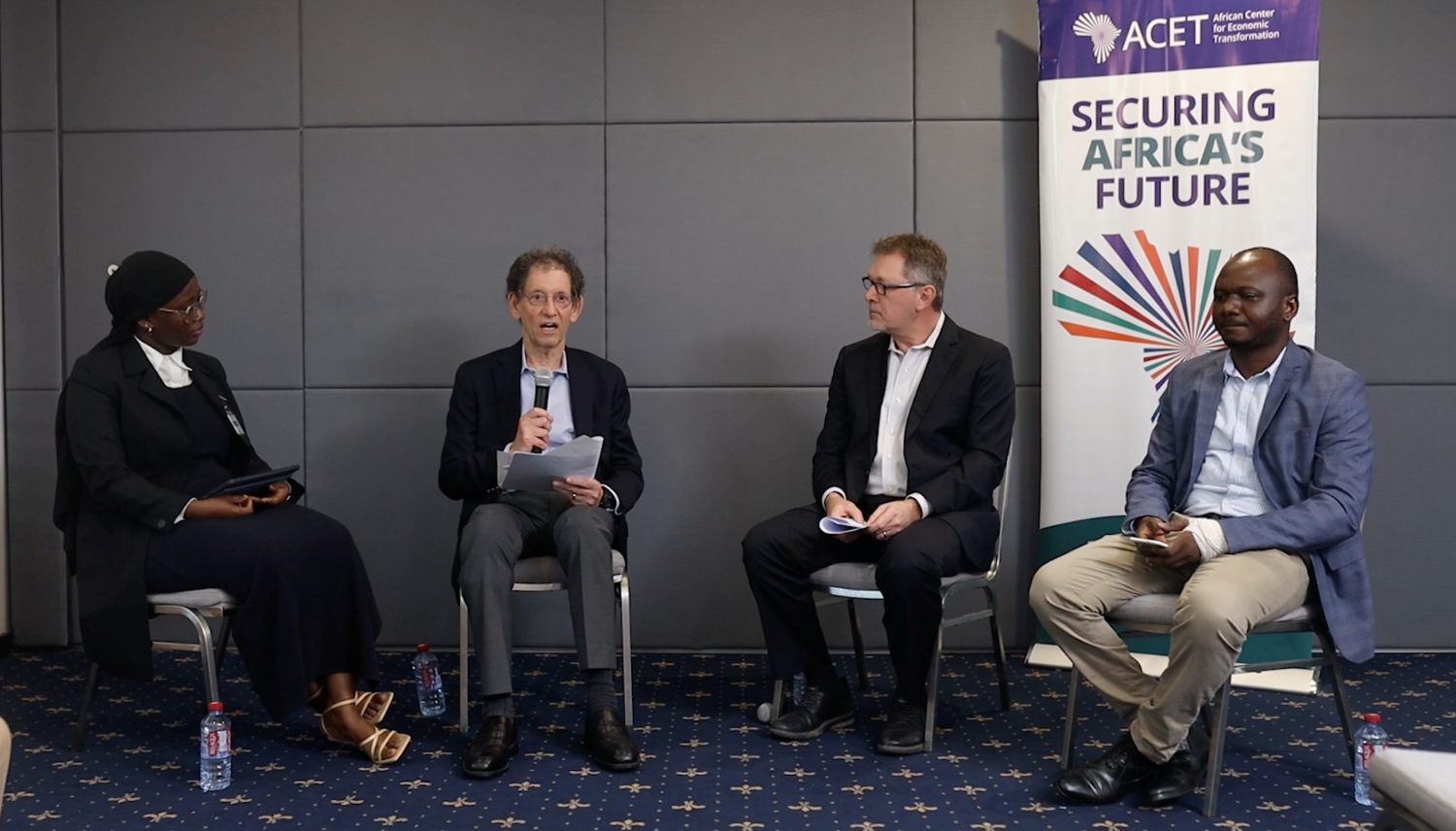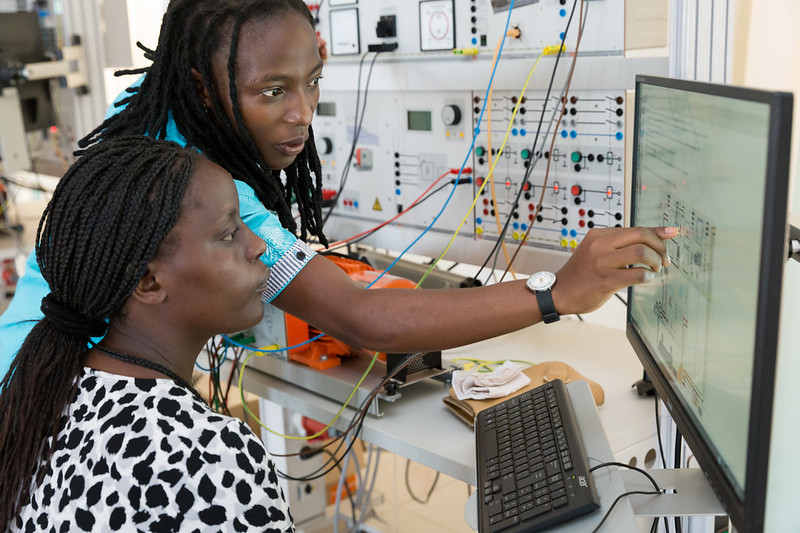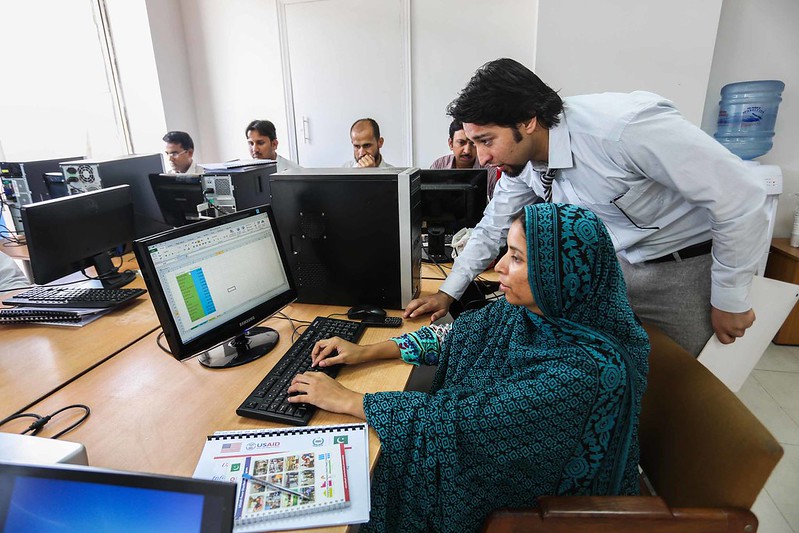Recommended
The United States, a leader in space exploration and innovation, has a unique opportunity to establish enduring diplomatic, commercial, and security ties with African nations through space cooperation—with the potential to yield substantial development benefits. The U.S. space sector is robust, an area of comparative strength vis-à-vis Europe, Russia, and China. By driving space cooperation, the U.S. can reinforce the rules-based order as articulated in international agreements like the Artemis Accords. Expanded space capabilities can also support the achievement of several of the UN Sustainable Development Goals, which range from improving data-driven governance to closing the global digital gap.
U.S. policymakers have an opportunity to implement a collaborative approach with emerging African space actors both to grow a peaceful and law-abiding community in space and to benefit from Africa's contributions to the global space ecosystem. Space capability can also serve a crucial infrastructure role, yielding similar benefits to “traditional” infrastructure—including facilitating access to 5G connectivity through low orbit satellites and addressing clean water and food security needs through remote sensing and satellite communications.
Key recommendations
- Develop a whole-of-government approach to US-Africa space cooperation and development, with a clear lead agency and a specific point of contact for foreign States
- Provide support for space as essential infrastructure through US development finance and assistance
- Increase support for African nations in managing their spectrum and developing national broadband plans
- Pilot a bilateral Space Development Program in Africa
- Expand bilateral and multilateral space-related security cooperation and assistance
- Improve awareness of US intentions in space and support to the public good in space
African policymakers see value in developing native space capabilities
African governments increasingly view space capability as a crucial component of basic infrastructure and essential to building a knowledge economy. Countries such as South Africa, Nigeria, and Egypt have well-established space agencies; others, such as Botswana and Rwanda, are just starting to build their space capabilities. All emerging space actors have their reasons for valuing investment in the space sector, but certain core themes persist. A study evaluating the rationales of 16 countries worldwide that established civil space agencies between 2014 and 2019—including the African Space Agency, the Kenya Space Agency, and the Zimbabwe Space Agency—found the following reasons:
- Economic: Growing the domestic sector to expand the domestic economy and boost gross domestic product.
- Socioeconomic: Improving the domestic welfare and using space data and applications to enhance existing governance activities, such as agriculture, mapping, and climate science.
- Coordination/centralization: Facilitating and integrating activities across the domestic space of academic, commercial, and government sectors.
- Geopolitical: Giving the government a platform to participate in the global space community, establishing the nation as a prominent space-faring nation, or benefiting the nations’ national security.
- Regulatory: Developing a regulatory framework to manage the space sector and comply with international law.[1]
Having decided that it is in their strategic interest to develop a space capability, many African nations are acting accordingly, investing in space-related services and the launch of satellites. The space budgets of African governments have grown significantly, from US$283 million in 2018 to $US503 million in 2020, rising another 9 percent in 2021 despite the COVID-19 pandemic.[2] Establishing a foundational space proficiency doesn’t necessarily mean building satellites and spaceports, however. The goal of any early space program should be to maximize the utility of space-based resources (orbits and frequency spectrum) and shared, publicly available, or commercial space services, from imagery to satellite communications, as an enabler of national and economic interests.
Still, barriers to space advancement in Africa have constrained the sector thus far. Challenges include competing imperatives for national resources and attention, nontechnical government bodies’ general lack of understanding of space-related capabilities and benefits, inconsistent funding, a small workforce, and dependency on external support. A country interested in developing “upstream” capabilities—including space hardware manufacturing and ground systems—faces significant fixed costs (research and development, operations, equipment, and specialized workforce). Lastly, there is a weak space “ecosystem,” with the workforce, governance infrastructure, and business and civil society participation needed for sustainable growth in the space sector.
Figure 1. African satellites launched by…

Source: Julie Michelle Klinger, China, Africa, and the Rest: Recent Trends in Space Science, Technology, and Satellite Development, Working Paper, China Africa Research Initiative (Washington, DC: School of Advanced International Studies, Johns Hopkins University, May 2020), http://www.sais-cari.org/ publications.
Advancing US-Africa space cooperation
Most countries that have any sort of positive relationship with the United States would probably welcome the opportunity to establish or expand space cooperation. The United States carries considerable space-related cachet in Africa but two primary barriers limit comprehensive US-Africa space cooperation at present: 1) lack of a “front door” or clear entry point for actors seeking to engage the United States on space-related goals or projects immediately; and 2) limited long-term strategy for US-Africa space cooperation or developing space-related capabilities, leading to a shortsighted approach to African partners that fails to recognize their potential for independent contributions to the space sector.
Policy recommendations
Potential African partners, faced with multiple US government offices with varying mandates and goals, struggle to identify points of contact to engage the United States for space cooperation and services. In the near term, policymakers should clarify a point of entry and take initial steps to expand US tools for space development:
Establish a point of contact for potential space partners. The State Department Office of Space Affairs mandate sould be expanded to include space development, or alternative office identified. This should include a high-level expert to coordinate US space development efforts with emerging space actors. An executive order, or mandate from Congress, could establish this position as a point of contact for parties interested in US space cooperation.
Provide support for space as essential infrastructure through US development finance and assistance. As a major contributor to international financial institutions such as the World Bank and African Development Bank, the U.S. could use its voice and influence to support an increased focus on space development in addition to “traditional” infrastructure such as roads and power. Both the AfDB and ADB have supported the development and launch of large geosynchronous communications satellites in the past, akin to the installation of undersea cables, but not the development of indigenous space capability more broadly. Millennium Challenge Corporation programs, ranging from the Innovation and Technology Program to the Infrastructure Accelerator Program, have a mandate that could more directly consider the growth of space applications and infrastructure in supporting the development of partners’ economies.[3] Tools such as the U.S. Export-Import Bank (EXIM), US International Development Finance Corporation (DFC), and US Trade and Development Agency’s “Access America” initiative could reduce the perceived risk for US space companies and accelerate private sector engagement with emerging space actors in Africa. EXIM and DFC should explore the space investment sector and—through congressionally-mandated report or otherwise—identify barriers, whether regulatory, legislative, or financial, that currently prevent the agencies from making financing available to such projects.
Increase support to African nations in managing their spectrum and developing national broadband plans. Designated frequency ranges (or bands) for satellites are a limited resource. The United States should expand the capacity of the United States Telecommunications Training Institute (USTTI), a nonprofit focused on training partners to manage their spectrum, deploy wireless technologies, develop national broadband plans, implement national cybersecurity strategies, support Internet deployment, launch cloud services, and ensure sound emergency communications plans. The US space development lead, when established, should proactively tap USTTI, the Federal Communications Commission International Bureau, and organizations such as the ITU Telecommunication Development Sector to advise US–Africa space cooperation and development programs. The administration, with support from Congress, should supply USTTI and the FCC with additional manpower and resources accordingly.
Pilot a Space Development Program in Africa. Under leadership of a designated office and space development lead, and designed with partners’ needs in mind, the United States should trial a dedicated space development program that provides programmatic structure, strategic-level advice, technical assistance, investment, human capital development, and support for public-private partnerships and start-up incubators in a country with demonstrated political will. This could include initiating space programs in countries such as Botswana, Rwanda, Namibia, Burkina Faso, Djibouti, and Zambia.
More broadly, the US should establish a whole-of-government approach to space cooperation, and communicate more fully with lawmakers when expansion is needed, including:
Develop a whole-of-government approach to US–Africa space cooperation and development, with a clear lead agency. An executive order, or mandated report or strategy from Congress, would clarify US support for a whole-of-government cooperation and development in the space sector, in accordance with the spirit of the US National Space Policy. Said lead would be responsible for interpreting the US National Space Policy, the US Space Priorities Framework and Defense Space Strategy through a development lens, and for advocating and coordinating action across the U.S. government accordingly. This group should focus on the pragmatic use of space capabilities and applications in US development, cooperation, and assistance programs.
Expand Space-Related Security Cooperation and Assistance. As part of a comprehensive approach to space-related security cooperation and assistance, the United States should foster long-term, strategic relationships in Africa by enabling endemic security of African telecommunications and data infrastructure. The US Space Command, the Secretary of the Air Force International Affairs, USAID and the Defense Security Cooperation University should develop and “roadshow” guidelines for space-related security cooperation for the US Africa Command headquarters and embassy-based offices of security cooperation. Security cooperation and assistance (U.S.C. Titles 10 and 22) and a revalidated National Geospatial-Intelligence Agency pro-cooperation posture should be applied to support space applications and space development in the security sector.
Increase US space cooperation and commerce with more advanced emerging African space actors. For more advanced emerging African space actors, the United States should increase collaboration for mutual benefit. Broadly speaking, such countries offer wide-open spaces, advantageous launch positions, natural resources, a growing workforce, a desire to transform their economies, and are committed to developing their space capability. Led by the State Department, countries that are good candidates for such engagement, if we take into consideration only their current space-related activity and capability, include Algeria, Egypt, Ghana, Kenya, Morocco, Nigeria, South Africa, Tanzania, and Tunisia.[4]
Increase multilateral space cooperation in Africa. The United States should also build bridges to regional or subregional space-related efforts, since they usually include emerging space actors with significant regional leadership roles. The European Space Agency and allies such as Italy and France have been working with African nations for decades. Interest in space cooperation and development is expected to grow with the projected launch of the African Space Agency, with Egypt to host its headquarters, in 2023. The United States should provide space attachés or liaisons, sponsor more projects, workshops, and regional training, and expand scientific research and exchanges in Africa-based forums.
Improve awareness of US intentions in space and support to the public good in space. The United States should socialize the public good it provides that underpin the African, and global, space economy and support governance and development goals. Whenever possible, the U.S. should support and collaborate with established African space actors and provide background papers on U.S. space contributions to the public good to educate both U.S. and African policymakers and diplomats. The US should more widely discuss US intent and reasoning for the Artemis Accords and their utility to emerging space actors and encourage African participation.
Promote geospatial data platforms, tools, and education that empower African space applications. Space-derived geospatial data is one facet of a greater digital ecosystem, and should be included as a line of effort while implementing USAID’s Digital Strategy.[5] To encourage the uptake of free and commercial data, and to spur market competition, the US should also support the development of geospatial data marketplaces.
For a map showing African space activities, capabilities, and infrastructure in 2019; a list of key US space actors in Africa; and examples of use cases, see the appendices to the PDF version of this brief.
[1] Renata Knittel Kommel, Ashley Peter, Mackenzie Puig-Hall, and Luc Riesbeck, Exploring Insights from Emerging Space Agencies, George Washington University, October 2020, https://aerospace.csis.org/wp-content/uploads/2020/10/2020_GWU_ExploringInsights_FINAL_2nd-Edits-101920-compressed.pdf
[2] Space in Africa, “African Space Industry Revenue to Surpass USD 10.24 Billion by 2024 Despite COVID-19 Setback,” July 6, 2021, https://africanews.space/african-space-industry-revenue-to-surpass-usd-10-24-billion-by-2024-despite-covid-19-setback/.
[3] Millennium Challenge Corporation, MCC Annual Partnerships Report 2021, 2022.
[4] Froehlich and Siebrits, Space Supporting Africa.
[5] “Administrator’s Message | USAID’s Digital Strategy | U.S. Agency for International Development,” April 15, 2020, https://www.usaid.gov/usaid-digital-strategy/00-administrators-message.
Rights & Permissions
You may use and disseminate CGD’s publications under these conditions.







